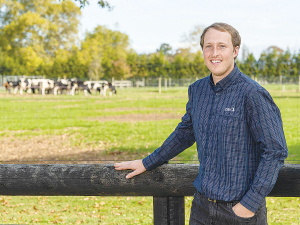Research has found that having semen from three bulls in one straw can increase dairy farmers’ average 56-day Non-Return Rate (NRR) by 4.2%.
The research was carried out in The Netherlands by CRV in partnership with the Belgian Blue Group. Initial trial results are based on NRR data from over 1,000 inseminations using CRV Fertabull Belgian Blue.
For every 100 inseminations, at least four more cows will get in calf using CRV’s Fertabull when compared with average conventional straws.
Fertabull straws contain semen from multiple sires, lengthening the life of the semen in the straws and giving cows a greater chance to get in calf.
CRV genetics product manager (NZ Market) Mitchell Koot says the research findings are good news for dairy farmers looking to tighten up calving patterns, reduce bobby calf numbers and breed higher-value dairy beef calves from their lowest genetic merit cows.
“This large-scale trial backs up the results that CRV’s New Zealand farmers have been experiencing since the introduction of CRV Fertabull more than 20 years ago,” he says.
“Our Fertabull Dairy beef options give dairy farmers the opportunity to maximise their mating performance, resulting in more days in milk and greater revenue.”
The trial compared the NRRs of herds when inseminated with a single Belgian Blue bull, and when they were inseminated using CRV’s Fertabull Belgian Blue straws, containing semen from three different Belgian Blue sires. The trial used 2,800 straws of CRV Fertabull Belgian Blue.
“Sperm cells remain viable for a limited period after insemination,” explains Koot.
“However, the length of this period varies from bull to bull. As a result, there is variation between bulls in the availability of viable sperm cells at different times in the cow’s fertility cycle. Therefore, mixing semen from different bulls increases the chance that sufficient sperm cells will be available at the right time for fertilisation. This increases the chance of pregnancy.”
Murchison dairy farmers Helen and Peter McLaren use CRV’s Fertabull to drive their in-calf rates and breed high value dairy beef.
The couple milks 220 cows on their 90-hectare property producing an average of 400 kgMS/cow. They have been CRV customers since 2007 and have used CRV Fertabull since 2014.
They use CRV’s Hereford Fertabull straws at the tail end of a six-week artificial insemination (AI) period. They use CRV Jersey sires across most of their mainly Friesian herd. Any cows not in calf at the end of AI are then naturally mated using Angus bulls.
In the 2021/22 season, the McLaren’s used 15 CRV Hereford Fertabull straws and got 15 white faced Hereford calves.
“We wanted a definite cut off between the main Jersey artificial insemination run and when the balance of the herd goes for natural mating where we use Angus bulls. So, we turned to CRV’s Hereford Fertabull,” says Helen.
“It has been great for our fertility. We know the cows are going to get in calf and they are easy calving animals. We’ve had great results.
“The Angus cross calves can be difficult to identify in the paddock. Now we have an obvious difference between our Jersey AI calves, the white-faced Hereford Fertabull calves and the naturally mated calves using Angus bulls.”
The Fertabull Hereford calves are also giving the McLaren’s a high value dairy beef product. The calves are grown through to 100kg before Christmas and then sold.
“We got $550 per bull and $500 per heifer last season so we are breeding valuable dairy beef calves that provide us with alternative income stream,” says Helen.
Koot says an increasing number of dairy farmers are recognising the added value of dairy beef calves and they are using a range of breeds to appeal to the beef market.


















